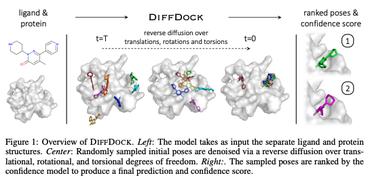Search Results for author: Jarrid Rector-Brooks
Found 13 papers, 9 papers with code
Sequence-Augmented SE(3)-Flow Matching For Conditional Protein Backbone Generation
no code implementations • 30 May 2024 • Guillaume Huguet, James Vuckovic, Kilian Fatras, Eric Thibodeau-Laufer, Pablo Lemos, Riashat Islam, Cheng-Hao Liu, Jarrid Rector-Brooks, Tara Akhound-Sadegh, Michael Bronstein, Alexander Tong, Avishek Joey Bose
Proteins are essential for almost all biological processes and derive their diverse functions from complex 3D structures, which are in turn determined by their amino acid sequences.
Generative Active Learning for the Search of Small-molecule Protein Binders
no code implementations • 2 May 2024 • Maksym Korablyov, Cheng-Hao Liu, Moksh Jain, Almer M. van der Sloot, Eric Jolicoeur, Edward Ruediger, Andrei Cristian Nica, Emmanuel Bengio, Kostiantyn Lapchevskyi, Daniel St-Cyr, Doris Alexandra Schuetz, Victor Ion Butoi, Jarrid Rector-Brooks, Simon Blackburn, Leo Feng, Hadi Nekoei, SaiKrishna Gottipati, Priyesh Vijayan, Prateek Gupta, Ladislav Rampášek, Sasikanth Avancha, Pierre-Luc Bacon, William L. Hamilton, Brooks Paige, Sanchit Misra, Stanislaw Kamil Jastrzebski, Bharat Kaul, Doina Precup, José Miguel Hernández-Lobato, Marwin Segler, Michael Bronstein, Anne Marinier, Mike Tyers, Yoshua Bengio
Despite substantial progress in machine learning for scientific discovery in recent years, truly de novo design of small molecules which exhibit a property of interest remains a significant challenge.
Iterated Denoising Energy Matching for Sampling from Boltzmann Densities
1 code implementation • 9 Feb 2024 • Tara Akhound-Sadegh, Jarrid Rector-Brooks, Avishek Joey Bose, Sarthak Mittal, Pablo Lemos, Cheng-Hao Liu, Marcin Sendera, Siamak Ravanbakhsh, Gauthier Gidel, Yoshua Bengio, Nikolay Malkin, Alexander Tong
Efficiently generating statistically independent samples from an unnormalized probability distribution, such as equilibrium samples of many-body systems, is a foundational problem in science.
Improved off-policy training of diffusion samplers
1 code implementation • 7 Feb 2024 • Marcin Sendera, Minsu Kim, Sarthak Mittal, Pablo Lemos, Luca Scimeca, Jarrid Rector-Brooks, Alexandre Adam, Yoshua Bengio, Nikolay Malkin
We study the problem of training diffusion models to sample from a distribution with a given unnormalized density or energy function.
SE(3)-Stochastic Flow Matching for Protein Backbone Generation
1 code implementation • 3 Oct 2023 • Avishek Joey Bose, Tara Akhound-Sadegh, Guillaume Huguet, Kilian Fatras, Jarrid Rector-Brooks, Cheng-Hao Liu, Andrei Cristian Nica, Maksym Korablyov, Michael Bronstein, Alexander Tong
The computational design of novel protein structures has the potential to impact numerous scientific disciplines greatly.
Thompson sampling for improved exploration in GFlowNets
no code implementations • 30 Jun 2023 • Jarrid Rector-Brooks, Kanika Madan, Moksh Jain, Maksym Korablyov, Cheng-Hao Liu, Sarath Chandar, Nikolay Malkin, Yoshua Bengio
Generative flow networks (GFlowNets) are amortized variational inference algorithms that treat sampling from a distribution over compositional objects as a sequential decision-making problem with a learnable action policy.
Improving and generalizing flow-based generative models with minibatch optimal transport
2 code implementations • 1 Feb 2023 • Alexander Tong, Kilian Fatras, Nikolay Malkin, Guillaume Huguet, Yanlei Zhang, Jarrid Rector-Brooks, Guy Wolf, Yoshua Bengio
CFM features a stable regression objective like that used to train the stochastic flow in diffusion models but enjoys the efficient inference of deterministic flow models.
Multi-Objective GFlowNets
1 code implementation • 23 Oct 2022 • Moksh Jain, Sharath Chandra Raparthy, Alex Hernandez-Garcia, Jarrid Rector-Brooks, Yoshua Bengio, Santiago Miret, Emmanuel Bengio
We study the problem of generating diverse candidates in the context of Multi-Objective Optimization.
Learning GFlowNets from partial episodes for improved convergence and stability
3 code implementations • 26 Sep 2022 • Kanika Madan, Jarrid Rector-Brooks, Maksym Korablyov, Emmanuel Bengio, Moksh Jain, Andrei Nica, Tom Bosc, Yoshua Bengio, Nikolay Malkin
Generative flow networks (GFlowNets) are a family of algorithms for training a sequential sampler of discrete objects under an unnormalized target density and have been successfully used for various probabilistic modeling tasks.
Biological Sequence Design with GFlowNets
1 code implementation • 2 Mar 2022 • Moksh Jain, Emmanuel Bengio, Alex-Hernandez Garcia, Jarrid Rector-Brooks, Bonaventure F. P. Dossou, Chanakya Ekbote, Jie Fu, Tianyu Zhang, Micheal Kilgour, Dinghuai Zhang, Lena Simine, Payel Das, Yoshua Bengio
In this work, we propose an active learning algorithm leveraging epistemic uncertainty estimation and the recently proposed GFlowNets as a generator of diverse candidate solutions, with the objective to obtain a diverse batch of useful (as defined by some utility function, for example, the predicted anti-microbial activity of a peptide) and informative candidates after each round.
RECOVER: sequential model optimization platform for combination drug repurposing identifies novel synergistic compounds in vitro
1 code implementation • 7 Feb 2022 • Paul Bertin, Jarrid Rector-Brooks, Deepak Sharma, Thomas Gaudelet, Andrew Anighoro, Torsten Gross, Francisco Martinez-Pena, Eileen L. Tang, Suraj M S, Cristian Regep, Jeremy Hayter, Maksym Korablyov, Nicholas Valiante, Almer van der Sloot, Mike Tyers, Charles Roberts, Michael M. Bronstein, Luke L. Lairson, Jake P. Taylor-King, Yoshua Bengio
For large libraries of small molecules, exhaustive combinatorial chemical screens become infeasible to perform when considering a range of disease models, assay conditions, and dose ranges.
DEUP: Direct Epistemic Uncertainty Prediction
1 code implementation • 16 Feb 2021 • Salem Lahlou, Moksh Jain, Hadi Nekoei, Victor Ion Butoi, Paul Bertin, Jarrid Rector-Brooks, Maksym Korablyov, Yoshua Bengio
Epistemic Uncertainty is a measure of the lack of knowledge of a learner which diminishes with more evidence.
Revisiting Projection-Free Optimization for Strongly Convex Constraint Sets
no code implementations • 14 Nov 2018 • Jarrid Rector-Brooks, Jun-Kun Wang, Barzan Mozafari
We also show that, for the general case of (smooth) non-convex functions, FW with line search converges with high probability to a stationary point at a rate of $O\left(\frac{1}{t}\right)$, as long as the constraint set is strongly convex -- one of the fastest convergence rates in non-convex optimization.




